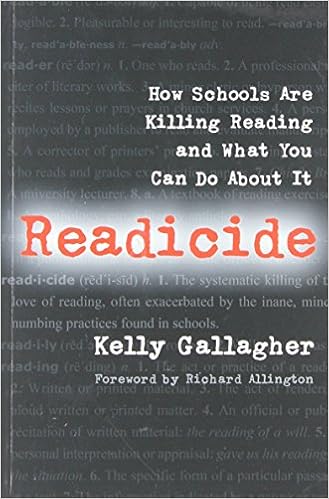One of my of my sub goals for the year is to read a pedagogy book each month. I hate pedagogy books. You'd think that books written by and for the people responsible for educating our young, and therefore intelligent strong readers themselves, would be well written. They aren't, as a rule. Generally there is about 60 pages of content delivered in a repetitive and overly formatted manner over 200 pages. (I feel there is a deeper statement about the education in the U.S. to be made here.) Nevertheless, if I have a weakness as a teacher, it is that I'm unfamiliar with the formal world of teaching and therefore have a hard time comparing notes with other teachers. Hence the goal.
So, for the genre, Readicide is a pretty decent read and the reason I'm blogging it is that I feel anyone interested in the state of education in the U.S. would find it interesting. (This means you parents.) I suspect that Gallagher had a broader audience in mind when he wrote Readicide.
Readicide does a good job tracing and outlining what's gone wrong in education over the past few years. He has, in fact, loads to say about No Child Left Behind. He isolates why we ever thought it was a good idea and comes just shy of calling it fraud...which it was. Continuing on, Gallagher traces how the NCLB policies have had far reaching effects. High stakes, multiple choice tests are just wrong headed.
Speaking as someone in the trenches, teaching the LD population: hallelujah brother. We need to be emphasizing critical thinking over fact memorization. We need to get them reading and thinking and experiencing. Teaching to these tests is producing smart kids who can't think their way out of paper bags with a flashlight and a map.
However, as good a job as Gallagher does outlining the problem, he doesn't spend much time on solutions. He points in some good directions, and I plan to follow up, but he ended up writing more of a polemic. Unfortunately for me, I'm already there.
Anyway, if you have a kid in school (private too) you should read this. It will give you a good basis of understanding for the issues involved and the pressures your student's teachers face. It will arm you with facts and point you to more credible sources about what's going on. More than anything else, this is a very good reference for those concerned with these issues. The references are voluminous and useful. Many teachers see what's happening and want to change things, but we need parent support to get the administrators to shift.

Pedagogy *is* pretty terrible. And it doesn't get any better when you get to graduate medical education—an admittedly small party of total education but one that a person might naively think would be interested by a desire took emulate evidence-based practice on medicine itself. And which isn't.
ReplyDelete"Trade Books" as a whole are dismal. Apparently, writing to more narrow audience means you don't have to write well *shrug*
ReplyDelete